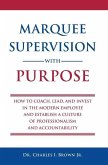101 Coaching Supervision Techniques, Approaches, Enquiries and Experiments
Herausgeber: Lucas, Michelle
101 Coaching Supervision Techniques, Approaches, Enquiries and Experiments
Herausgeber: Lucas, Michelle
- Gebundenes Buch
- Merkliste
- Auf die Merkliste
- Bewerten Bewerten
- Teilen
- Produkt teilen
- Produkterinnerung
- Produkterinnerung
This book locates 101 practical coaching supervision techniques in their theoretical context. It is organised into ten chapters, each reflecting a different philosophical basis for the coaching supervision work: Existential, Gestalt, Person Centred, Positive Psychology, Psychodynamic, Solution Focused, Systemic, Thinking Environment, Transpersonal and finally an Eclectic chapter. With contributions and insights from leaders in the field, this book outlines the different philosophies and their principles and explains their application in practice. The book will help readers determine which…mehr
Andere Kunden interessierten sich auch für
![Psychodynamic Coaching and Supervision for Executives Psychodynamic Coaching and Supervision for Executives]() Thomas KretschmarPsychodynamic Coaching and Supervision for Executives187,99 €
Thomas KretschmarPsychodynamic Coaching and Supervision for Executives187,99 €![Building an Organizational Coaching Culture Building an Organizational Coaching Culture]() Building an Organizational Coaching Culture196,99 €
Building an Organizational Coaching Culture196,99 €![Coaching Models Coaching Models]() Diane LennardCoaching Models205,99 €
Diane LennardCoaching Models205,99 €![Coaching and Mentoring for Work-Life Balance Coaching and Mentoring for Work-Life Balance]() Julie Haddock-MillarCoaching and Mentoring for Work-Life Balance195,99 €
Julie Haddock-MillarCoaching and Mentoring for Work-Life Balance195,99 €![The Values-Driven Organization The Values-Driven Organization]() Richard BarrettThe Values-Driven Organization260,99 €
Richard BarrettThe Values-Driven Organization260,99 €![Marquee Supervision with Purpose Marquee Supervision with Purpose]() Charles Ivan BrownMarquee Supervision with Purpose27,99 €
Charles Ivan BrownMarquee Supervision with Purpose27,99 €![Conservative Views 101 Plus Conservative Views 101 Plus]() Alex GallConservative Views 101 Plus33,99 €
Alex GallConservative Views 101 Plus33,99 €-
-
-
This book locates 101 practical coaching supervision techniques in their theoretical context. It is organised into ten chapters, each reflecting a different philosophical basis for the coaching supervision work: Existential, Gestalt, Person Centred, Positive Psychology, Psychodynamic, Solution Focused, Systemic, Thinking Environment, Transpersonal and finally an Eclectic chapter. With contributions and insights from leaders in the field, this book outlines the different philosophies and their principles and explains their application in practice. The book will help readers determine which technique to use and when, as well as offering a step-by-step guide to implementing or adapting it for their own work. With a breadth of techniques, the book will help all supervisors broaden their repertoire and ultimately become a better practitioner. Accessible and practical, this book is a valuable resource for experienced and novice supervisors as well as their supervisees. It will inspire them to keep their supervision and coaching practices both current and fresh, offering a diverse range of techniques to experiment with.
Hinweis: Dieser Artikel kann nur an eine deutsche Lieferadresse ausgeliefert werden.
Hinweis: Dieser Artikel kann nur an eine deutsche Lieferadresse ausgeliefert werden.
Produktdetails
- Produktdetails
- Verlag: Routledge
- Seitenzahl: 400
- Erscheinungstermin: 12. Mai 2020
- Englisch
- Abmessung: 240mm x 161mm x 26mm
- Gewicht: 763g
- ISBN-13: 9780367481148
- ISBN-10: 0367481146
- Artikelnr.: 69984261
- Herstellerkennzeichnung
- Libri GmbH
- Europaallee 1
- 36244 Bad Hersfeld
- gpsr@libri.de
- Verlag: Routledge
- Seitenzahl: 400
- Erscheinungstermin: 12. Mai 2020
- Englisch
- Abmessung: 240mm x 161mm x 26mm
- Gewicht: 763g
- ISBN-13: 9780367481148
- ISBN-10: 0367481146
- Artikelnr.: 69984261
- Herstellerkennzeichnung
- Libri GmbH
- Europaallee 1
- 36244 Bad Hersfeld
- gpsr@libri.de
Michelle Lucas is Director of Greenfields Consulting Limited, specialising in executive coaching, coaching supervision and the training of internal coaches, mentors and supervisors. She also supervises the MA Students at Oxford Brookes University, UK.
Foreword
Introduction
Chapter 1: An Eclectic Approach to Coaching Supervision
by David Clutterbuck; 3-2-1: A Reflective Writing Technique by Liz Ford
Affirmations and Alternatives by Michelle Lucas and Carol Whitaker
Arrivals & Departures with Picture Cards by Michelle Lucas and Charlotte Housden
Building Confidence: Authority
Presence and Impact by Julia Menaul
Capturing Journeys on a Big Scale by Michelle Lucas and Andy King
Deepening Reflection by Tammy Turner
Developing Behavioural Flexibility by Anne Calleja
Developing Coach Maturity by David Clutterbuck
Developing Courage: Naming Elephants and Speaking Truth to Power by Marie Faire
Dilemma Cards by Michelle Lucas and Carol Whitaker
Exploring Boundaries by Angela Dunbar
Exploring Relationships with Clean Language by Angela Dunbar
Exploring the Supervisee's Client with Clean Networks by Angela Dunbar
Feeling Stuck by Anne Calleja
Fishbowl Supervision by Michelle Lucas & Tammy Turner
I am Part of a System by Tammy Turner
Issues
Insights
Ideas and Intentions by David Clutterbuck
Keeping It Real by Michelle Lucas and Carol Whitaker
Line of Enquiry by Michelle Lucas and Carol Whitaker
Metaphor Magic Box by Lily Seto
Making Friends with our Inner Critic by Clare Norman
Mentor Coaching by Clare Norman
Misfits by Michelle Lucas
Quiet by Michelle Lucas
Reflecting Through Action Inquiry by Christine Champion
Reflective Writing by Michelle Lucas and Christine Champion
Rehearse
Review
Repeat... by Michelle Lucas
Tammy Turner and Carol Whitaker
Rush Writing by Clare Norman
Seven Conversations by David Clutterbuck
Situation-Thoughts-Consequences by Carmelina Lawton-Smith
Supervising with Developmental Action Logics by Claire Davey
Supervision with LEGO® by Damian Goldvarg
Tapping into The Client Perspective by Lesley Matile
The Supervisor in 'Tutor' Mode by David Clutterbuck
The Three C's: Contract
Competence and Client's Best Interest by Marie Faire
Tree Perspectives: growing your practice through creative reflective writing by Jackee Holder
Trial Triumph Trivia by Clare Norman
Use of Attachment Theory in Supervision by Henry Campion
Using AI in Supervision by David Clutterbuck
Using Vision Boards by Liz Ford
Writing the Labyrinth by Jackee Holder
Chapter 2: An Existential Approach to Coaching Supervision
by Ernesto Spinelli; Deliberately Self-Centred Supervision by Michelle Lucas
Harnessing Self-Doubt by Michelle Lucas
Intentions and Interventions by Benita Treanor
The Value of Noticing by Diane Hanna
Working with Shame Using Embodied Coaching by Tsafi Lederman and Jenny Stacey
Chapter 3: A Gestalt Approach to Coaching Supervision
by Julie Allan and Alison Whybrow; Giving an Object a Voice by Michelle Lucas
Inner Noticing by Julie Allan & Alison Whybrow
Supervision and Sensing by Claire Davey
Transformative Explorations Through Objects and Metaphor by Sue Congram
Two Chair Experiment by Alison Whybrow & Julie Allan
Working with Blocks by Julie Allan & Alison Whybrow
Working with Gesture by Alison Whybrow & Julie Allan
Chapter 4: A Person Centred Approach to Coaching Supervision
by Linda Aspey; Exploring Congruence by Michelle Lucas
Supervisee-led Supervision by Louise Sheppard
Chapter 5: A Positive Psychology Approach to Coaching Supervision
by Carmelina Lawton-Smith; 5% Sentences by Carmelina Lawton-Smith
eMotive Cards by Peter Duffell
FeedForward by Carmelina Lawton-Smith
Give Yourself An 'A' by Clare Norman
Good News by Michelle Lucas and Carol Whitaker
Personal Strengths Review by Carmelina Lawton-Smith
Strengths Cards by Carmelina Lawton-Smith
Using Metaphor to Explore 'at my best' by Angela Dunbar
Chapter 6: A Psychodynamic Perspective: A Developmental Transactional Analysis Approach to Coaching Supervision
by Lynda Tongue; CHECKS Self Supervision Checklist by Lynda Tongue
Contracting using Four P's by Michelle Lucas
Desert Island Fantasy by Michelle Lucas & Christine Champion
Discounting and the Steps to Success by Lynda Tongue
Exploring the Potential for Collusion by Michelle Lucas
Exploring Transference and Countertransference by Michelle Lucas and Anne Calleja
Focus on Feelings by Michelle Lucas and Carol Whitaker
Handling Relationship Conflict Using the Drama Triangle by Julia Menaul
Parallel Process by Lynda Tongue
STEPS for Supervision by Lynda Tongue
Using Time Structuring to Understand Intimacy in Relationships by David Crowe and Michelle Lucas
Chapter 7: A Solution Focused Approach to Coaching Supervision
by Evan George and Denise Yusuf; Sit in Three Chairs by Fredrike Bannink
Solution Focused Scaling Questions by Evan George
Sparkling Moments: Instances and Exceptions by Evan George and Denise Yusuf
Stopping and Starting by Carmelina Lawton Smith and Evan George
The Tomorrow Question by Michelle Lucas
Transferring Competence by Fredrike Bannink
Chapter 8: A Systemic Approach to Coaching Supervision
by Maren Donata Urschel; Mapping What Is by Maren Donata Urschel
One Step Towards Better by Maren Donata Urschel
Resourcing by Maren Donata Urschel
Systemically Oriented Questions by Maren Donata Urschel
Using Free Movement by Damion Wonfor
Working with the Seven Eyed Model by Michelle Lucas
Working with the Shadow by Clare Norman
Working with the Supervisee's Dilemma by Damion Wonfor
Chapter 9: A Thinking Environment Approach to Coaching Supervision
by Linda Aspey; Dialogue by Linda Aspey
Rounds by Linda Aspey
Thinking Pairs by Linda Aspey
Chapter 10: A Transpersonal Approach to Coaching Supervision
by Hetty Einzig; Centring by Paul King
Healthy Self-feedback by Helen Reuben
Ideal Model by Hetty Einzig
Self-Preparation for Supervisors by Helen Reuben
The Two Dimensions of Growth by Hetty Einzig
Using the Outdoors by Liz Ford
What's My Environmental Footprint? by Penny Walker
Wise Being by Hetty Einzig
Working our Sub-personalities by Hetty Einzig
Working with Emergent Purpose by Hetty Einzig
Introduction
Chapter 1: An Eclectic Approach to Coaching Supervision
by David Clutterbuck; 3-2-1: A Reflective Writing Technique by Liz Ford
Affirmations and Alternatives by Michelle Lucas and Carol Whitaker
Arrivals & Departures with Picture Cards by Michelle Lucas and Charlotte Housden
Building Confidence: Authority
Presence and Impact by Julia Menaul
Capturing Journeys on a Big Scale by Michelle Lucas and Andy King
Deepening Reflection by Tammy Turner
Developing Behavioural Flexibility by Anne Calleja
Developing Coach Maturity by David Clutterbuck
Developing Courage: Naming Elephants and Speaking Truth to Power by Marie Faire
Dilemma Cards by Michelle Lucas and Carol Whitaker
Exploring Boundaries by Angela Dunbar
Exploring Relationships with Clean Language by Angela Dunbar
Exploring the Supervisee's Client with Clean Networks by Angela Dunbar
Feeling Stuck by Anne Calleja
Fishbowl Supervision by Michelle Lucas & Tammy Turner
I am Part of a System by Tammy Turner
Issues
Insights
Ideas and Intentions by David Clutterbuck
Keeping It Real by Michelle Lucas and Carol Whitaker
Line of Enquiry by Michelle Lucas and Carol Whitaker
Metaphor Magic Box by Lily Seto
Making Friends with our Inner Critic by Clare Norman
Mentor Coaching by Clare Norman
Misfits by Michelle Lucas
Quiet by Michelle Lucas
Reflecting Through Action Inquiry by Christine Champion
Reflective Writing by Michelle Lucas and Christine Champion
Rehearse
Review
Repeat... by Michelle Lucas
Tammy Turner and Carol Whitaker
Rush Writing by Clare Norman
Seven Conversations by David Clutterbuck
Situation-Thoughts-Consequences by Carmelina Lawton-Smith
Supervising with Developmental Action Logics by Claire Davey
Supervision with LEGO® by Damian Goldvarg
Tapping into The Client Perspective by Lesley Matile
The Supervisor in 'Tutor' Mode by David Clutterbuck
The Three C's: Contract
Competence and Client's Best Interest by Marie Faire
Tree Perspectives: growing your practice through creative reflective writing by Jackee Holder
Trial Triumph Trivia by Clare Norman
Use of Attachment Theory in Supervision by Henry Campion
Using AI in Supervision by David Clutterbuck
Using Vision Boards by Liz Ford
Writing the Labyrinth by Jackee Holder
Chapter 2: An Existential Approach to Coaching Supervision
by Ernesto Spinelli; Deliberately Self-Centred Supervision by Michelle Lucas
Harnessing Self-Doubt by Michelle Lucas
Intentions and Interventions by Benita Treanor
The Value of Noticing by Diane Hanna
Working with Shame Using Embodied Coaching by Tsafi Lederman and Jenny Stacey
Chapter 3: A Gestalt Approach to Coaching Supervision
by Julie Allan and Alison Whybrow; Giving an Object a Voice by Michelle Lucas
Inner Noticing by Julie Allan & Alison Whybrow
Supervision and Sensing by Claire Davey
Transformative Explorations Through Objects and Metaphor by Sue Congram
Two Chair Experiment by Alison Whybrow & Julie Allan
Working with Blocks by Julie Allan & Alison Whybrow
Working with Gesture by Alison Whybrow & Julie Allan
Chapter 4: A Person Centred Approach to Coaching Supervision
by Linda Aspey; Exploring Congruence by Michelle Lucas
Supervisee-led Supervision by Louise Sheppard
Chapter 5: A Positive Psychology Approach to Coaching Supervision
by Carmelina Lawton-Smith; 5% Sentences by Carmelina Lawton-Smith
eMotive Cards by Peter Duffell
FeedForward by Carmelina Lawton-Smith
Give Yourself An 'A' by Clare Norman
Good News by Michelle Lucas and Carol Whitaker
Personal Strengths Review by Carmelina Lawton-Smith
Strengths Cards by Carmelina Lawton-Smith
Using Metaphor to Explore 'at my best' by Angela Dunbar
Chapter 6: A Psychodynamic Perspective: A Developmental Transactional Analysis Approach to Coaching Supervision
by Lynda Tongue; CHECKS Self Supervision Checklist by Lynda Tongue
Contracting using Four P's by Michelle Lucas
Desert Island Fantasy by Michelle Lucas & Christine Champion
Discounting and the Steps to Success by Lynda Tongue
Exploring the Potential for Collusion by Michelle Lucas
Exploring Transference and Countertransference by Michelle Lucas and Anne Calleja
Focus on Feelings by Michelle Lucas and Carol Whitaker
Handling Relationship Conflict Using the Drama Triangle by Julia Menaul
Parallel Process by Lynda Tongue
STEPS for Supervision by Lynda Tongue
Using Time Structuring to Understand Intimacy in Relationships by David Crowe and Michelle Lucas
Chapter 7: A Solution Focused Approach to Coaching Supervision
by Evan George and Denise Yusuf; Sit in Three Chairs by Fredrike Bannink
Solution Focused Scaling Questions by Evan George
Sparkling Moments: Instances and Exceptions by Evan George and Denise Yusuf
Stopping and Starting by Carmelina Lawton Smith and Evan George
The Tomorrow Question by Michelle Lucas
Transferring Competence by Fredrike Bannink
Chapter 8: A Systemic Approach to Coaching Supervision
by Maren Donata Urschel; Mapping What Is by Maren Donata Urschel
One Step Towards Better by Maren Donata Urschel
Resourcing by Maren Donata Urschel
Systemically Oriented Questions by Maren Donata Urschel
Using Free Movement by Damion Wonfor
Working with the Seven Eyed Model by Michelle Lucas
Working with the Shadow by Clare Norman
Working with the Supervisee's Dilemma by Damion Wonfor
Chapter 9: A Thinking Environment Approach to Coaching Supervision
by Linda Aspey; Dialogue by Linda Aspey
Rounds by Linda Aspey
Thinking Pairs by Linda Aspey
Chapter 10: A Transpersonal Approach to Coaching Supervision
by Hetty Einzig; Centring by Paul King
Healthy Self-feedback by Helen Reuben
Ideal Model by Hetty Einzig
Self-Preparation for Supervisors by Helen Reuben
The Two Dimensions of Growth by Hetty Einzig
Using the Outdoors by Liz Ford
What's My Environmental Footprint? by Penny Walker
Wise Being by Hetty Einzig
Working our Sub-personalities by Hetty Einzig
Working with Emergent Purpose by Hetty Einzig
Foreword
Introduction
Chapter 1: An Eclectic Approach to Coaching Supervision
by David Clutterbuck; 3-2-1: A Reflective Writing Technique by Liz Ford
Affirmations and Alternatives by Michelle Lucas and Carol Whitaker
Arrivals & Departures with Picture Cards by Michelle Lucas and Charlotte Housden
Building Confidence: Authority
Presence and Impact by Julia Menaul
Capturing Journeys on a Big Scale by Michelle Lucas and Andy King
Deepening Reflection by Tammy Turner
Developing Behavioural Flexibility by Anne Calleja
Developing Coach Maturity by David Clutterbuck
Developing Courage: Naming Elephants and Speaking Truth to Power by Marie Faire
Dilemma Cards by Michelle Lucas and Carol Whitaker
Exploring Boundaries by Angela Dunbar
Exploring Relationships with Clean Language by Angela Dunbar
Exploring the Supervisee's Client with Clean Networks by Angela Dunbar
Feeling Stuck by Anne Calleja
Fishbowl Supervision by Michelle Lucas & Tammy Turner
I am Part of a System by Tammy Turner
Issues
Insights
Ideas and Intentions by David Clutterbuck
Keeping It Real by Michelle Lucas and Carol Whitaker
Line of Enquiry by Michelle Lucas and Carol Whitaker
Metaphor Magic Box by Lily Seto
Making Friends with our Inner Critic by Clare Norman
Mentor Coaching by Clare Norman
Misfits by Michelle Lucas
Quiet by Michelle Lucas
Reflecting Through Action Inquiry by Christine Champion
Reflective Writing by Michelle Lucas and Christine Champion
Rehearse
Review
Repeat... by Michelle Lucas
Tammy Turner and Carol Whitaker
Rush Writing by Clare Norman
Seven Conversations by David Clutterbuck
Situation-Thoughts-Consequences by Carmelina Lawton-Smith
Supervising with Developmental Action Logics by Claire Davey
Supervision with LEGO® by Damian Goldvarg
Tapping into The Client Perspective by Lesley Matile
The Supervisor in 'Tutor' Mode by David Clutterbuck
The Three C's: Contract
Competence and Client's Best Interest by Marie Faire
Tree Perspectives: growing your practice through creative reflective writing by Jackee Holder
Trial Triumph Trivia by Clare Norman
Use of Attachment Theory in Supervision by Henry Campion
Using AI in Supervision by David Clutterbuck
Using Vision Boards by Liz Ford
Writing the Labyrinth by Jackee Holder
Chapter 2: An Existential Approach to Coaching Supervision
by Ernesto Spinelli; Deliberately Self-Centred Supervision by Michelle Lucas
Harnessing Self-Doubt by Michelle Lucas
Intentions and Interventions by Benita Treanor
The Value of Noticing by Diane Hanna
Working with Shame Using Embodied Coaching by Tsafi Lederman and Jenny Stacey
Chapter 3: A Gestalt Approach to Coaching Supervision
by Julie Allan and Alison Whybrow; Giving an Object a Voice by Michelle Lucas
Inner Noticing by Julie Allan & Alison Whybrow
Supervision and Sensing by Claire Davey
Transformative Explorations Through Objects and Metaphor by Sue Congram
Two Chair Experiment by Alison Whybrow & Julie Allan
Working with Blocks by Julie Allan & Alison Whybrow
Working with Gesture by Alison Whybrow & Julie Allan
Chapter 4: A Person Centred Approach to Coaching Supervision
by Linda Aspey; Exploring Congruence by Michelle Lucas
Supervisee-led Supervision by Louise Sheppard
Chapter 5: A Positive Psychology Approach to Coaching Supervision
by Carmelina Lawton-Smith; 5% Sentences by Carmelina Lawton-Smith
eMotive Cards by Peter Duffell
FeedForward by Carmelina Lawton-Smith
Give Yourself An 'A' by Clare Norman
Good News by Michelle Lucas and Carol Whitaker
Personal Strengths Review by Carmelina Lawton-Smith
Strengths Cards by Carmelina Lawton-Smith
Using Metaphor to Explore 'at my best' by Angela Dunbar
Chapter 6: A Psychodynamic Perspective: A Developmental Transactional Analysis Approach to Coaching Supervision
by Lynda Tongue; CHECKS Self Supervision Checklist by Lynda Tongue
Contracting using Four P's by Michelle Lucas
Desert Island Fantasy by Michelle Lucas & Christine Champion
Discounting and the Steps to Success by Lynda Tongue
Exploring the Potential for Collusion by Michelle Lucas
Exploring Transference and Countertransference by Michelle Lucas and Anne Calleja
Focus on Feelings by Michelle Lucas and Carol Whitaker
Handling Relationship Conflict Using the Drama Triangle by Julia Menaul
Parallel Process by Lynda Tongue
STEPS for Supervision by Lynda Tongue
Using Time Structuring to Understand Intimacy in Relationships by David Crowe and Michelle Lucas
Chapter 7: A Solution Focused Approach to Coaching Supervision
by Evan George and Denise Yusuf; Sit in Three Chairs by Fredrike Bannink
Solution Focused Scaling Questions by Evan George
Sparkling Moments: Instances and Exceptions by Evan George and Denise Yusuf
Stopping and Starting by Carmelina Lawton Smith and Evan George
The Tomorrow Question by Michelle Lucas
Transferring Competence by Fredrike Bannink
Chapter 8: A Systemic Approach to Coaching Supervision
by Maren Donata Urschel; Mapping What Is by Maren Donata Urschel
One Step Towards Better by Maren Donata Urschel
Resourcing by Maren Donata Urschel
Systemically Oriented Questions by Maren Donata Urschel
Using Free Movement by Damion Wonfor
Working with the Seven Eyed Model by Michelle Lucas
Working with the Shadow by Clare Norman
Working with the Supervisee's Dilemma by Damion Wonfor
Chapter 9: A Thinking Environment Approach to Coaching Supervision
by Linda Aspey; Dialogue by Linda Aspey
Rounds by Linda Aspey
Thinking Pairs by Linda Aspey
Chapter 10: A Transpersonal Approach to Coaching Supervision
by Hetty Einzig; Centring by Paul King
Healthy Self-feedback by Helen Reuben
Ideal Model by Hetty Einzig
Self-Preparation for Supervisors by Helen Reuben
The Two Dimensions of Growth by Hetty Einzig
Using the Outdoors by Liz Ford
What's My Environmental Footprint? by Penny Walker
Wise Being by Hetty Einzig
Working our Sub-personalities by Hetty Einzig
Working with Emergent Purpose by Hetty Einzig
Introduction
Chapter 1: An Eclectic Approach to Coaching Supervision
by David Clutterbuck; 3-2-1: A Reflective Writing Technique by Liz Ford
Affirmations and Alternatives by Michelle Lucas and Carol Whitaker
Arrivals & Departures with Picture Cards by Michelle Lucas and Charlotte Housden
Building Confidence: Authority
Presence and Impact by Julia Menaul
Capturing Journeys on a Big Scale by Michelle Lucas and Andy King
Deepening Reflection by Tammy Turner
Developing Behavioural Flexibility by Anne Calleja
Developing Coach Maturity by David Clutterbuck
Developing Courage: Naming Elephants and Speaking Truth to Power by Marie Faire
Dilemma Cards by Michelle Lucas and Carol Whitaker
Exploring Boundaries by Angela Dunbar
Exploring Relationships with Clean Language by Angela Dunbar
Exploring the Supervisee's Client with Clean Networks by Angela Dunbar
Feeling Stuck by Anne Calleja
Fishbowl Supervision by Michelle Lucas & Tammy Turner
I am Part of a System by Tammy Turner
Issues
Insights
Ideas and Intentions by David Clutterbuck
Keeping It Real by Michelle Lucas and Carol Whitaker
Line of Enquiry by Michelle Lucas and Carol Whitaker
Metaphor Magic Box by Lily Seto
Making Friends with our Inner Critic by Clare Norman
Mentor Coaching by Clare Norman
Misfits by Michelle Lucas
Quiet by Michelle Lucas
Reflecting Through Action Inquiry by Christine Champion
Reflective Writing by Michelle Lucas and Christine Champion
Rehearse
Review
Repeat... by Michelle Lucas
Tammy Turner and Carol Whitaker
Rush Writing by Clare Norman
Seven Conversations by David Clutterbuck
Situation-Thoughts-Consequences by Carmelina Lawton-Smith
Supervising with Developmental Action Logics by Claire Davey
Supervision with LEGO® by Damian Goldvarg
Tapping into The Client Perspective by Lesley Matile
The Supervisor in 'Tutor' Mode by David Clutterbuck
The Three C's: Contract
Competence and Client's Best Interest by Marie Faire
Tree Perspectives: growing your practice through creative reflective writing by Jackee Holder
Trial Triumph Trivia by Clare Norman
Use of Attachment Theory in Supervision by Henry Campion
Using AI in Supervision by David Clutterbuck
Using Vision Boards by Liz Ford
Writing the Labyrinth by Jackee Holder
Chapter 2: An Existential Approach to Coaching Supervision
by Ernesto Spinelli; Deliberately Self-Centred Supervision by Michelle Lucas
Harnessing Self-Doubt by Michelle Lucas
Intentions and Interventions by Benita Treanor
The Value of Noticing by Diane Hanna
Working with Shame Using Embodied Coaching by Tsafi Lederman and Jenny Stacey
Chapter 3: A Gestalt Approach to Coaching Supervision
by Julie Allan and Alison Whybrow; Giving an Object a Voice by Michelle Lucas
Inner Noticing by Julie Allan & Alison Whybrow
Supervision and Sensing by Claire Davey
Transformative Explorations Through Objects and Metaphor by Sue Congram
Two Chair Experiment by Alison Whybrow & Julie Allan
Working with Blocks by Julie Allan & Alison Whybrow
Working with Gesture by Alison Whybrow & Julie Allan
Chapter 4: A Person Centred Approach to Coaching Supervision
by Linda Aspey; Exploring Congruence by Michelle Lucas
Supervisee-led Supervision by Louise Sheppard
Chapter 5: A Positive Psychology Approach to Coaching Supervision
by Carmelina Lawton-Smith; 5% Sentences by Carmelina Lawton-Smith
eMotive Cards by Peter Duffell
FeedForward by Carmelina Lawton-Smith
Give Yourself An 'A' by Clare Norman
Good News by Michelle Lucas and Carol Whitaker
Personal Strengths Review by Carmelina Lawton-Smith
Strengths Cards by Carmelina Lawton-Smith
Using Metaphor to Explore 'at my best' by Angela Dunbar
Chapter 6: A Psychodynamic Perspective: A Developmental Transactional Analysis Approach to Coaching Supervision
by Lynda Tongue; CHECKS Self Supervision Checklist by Lynda Tongue
Contracting using Four P's by Michelle Lucas
Desert Island Fantasy by Michelle Lucas & Christine Champion
Discounting and the Steps to Success by Lynda Tongue
Exploring the Potential for Collusion by Michelle Lucas
Exploring Transference and Countertransference by Michelle Lucas and Anne Calleja
Focus on Feelings by Michelle Lucas and Carol Whitaker
Handling Relationship Conflict Using the Drama Triangle by Julia Menaul
Parallel Process by Lynda Tongue
STEPS for Supervision by Lynda Tongue
Using Time Structuring to Understand Intimacy in Relationships by David Crowe and Michelle Lucas
Chapter 7: A Solution Focused Approach to Coaching Supervision
by Evan George and Denise Yusuf; Sit in Three Chairs by Fredrike Bannink
Solution Focused Scaling Questions by Evan George
Sparkling Moments: Instances and Exceptions by Evan George and Denise Yusuf
Stopping and Starting by Carmelina Lawton Smith and Evan George
The Tomorrow Question by Michelle Lucas
Transferring Competence by Fredrike Bannink
Chapter 8: A Systemic Approach to Coaching Supervision
by Maren Donata Urschel; Mapping What Is by Maren Donata Urschel
One Step Towards Better by Maren Donata Urschel
Resourcing by Maren Donata Urschel
Systemically Oriented Questions by Maren Donata Urschel
Using Free Movement by Damion Wonfor
Working with the Seven Eyed Model by Michelle Lucas
Working with the Shadow by Clare Norman
Working with the Supervisee's Dilemma by Damion Wonfor
Chapter 9: A Thinking Environment Approach to Coaching Supervision
by Linda Aspey; Dialogue by Linda Aspey
Rounds by Linda Aspey
Thinking Pairs by Linda Aspey
Chapter 10: A Transpersonal Approach to Coaching Supervision
by Hetty Einzig; Centring by Paul King
Healthy Self-feedback by Helen Reuben
Ideal Model by Hetty Einzig
Self-Preparation for Supervisors by Helen Reuben
The Two Dimensions of Growth by Hetty Einzig
Using the Outdoors by Liz Ford
What's My Environmental Footprint? by Penny Walker
Wise Being by Hetty Einzig
Working our Sub-personalities by Hetty Einzig
Working with Emergent Purpose by Hetty Einzig








